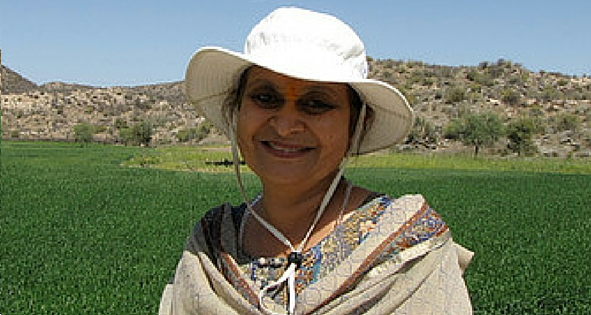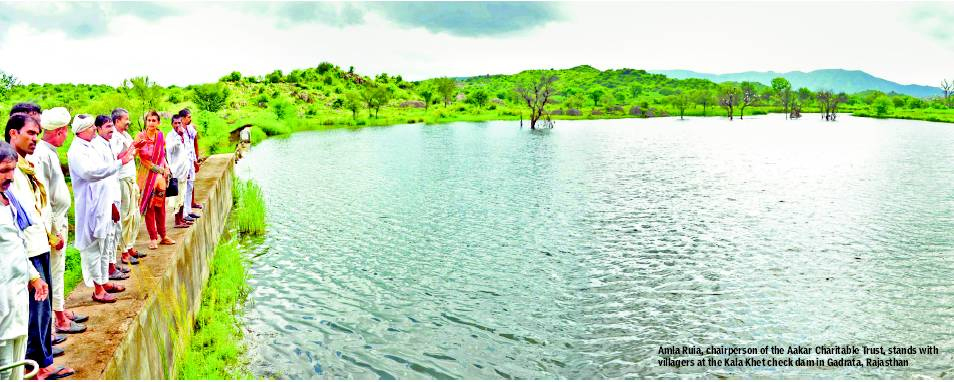Published on: 3/28/2016IST
Meet the Woman who Made 100 Villages Rich Utilizing Conventional Water Collecting Strategies

Amla Ruia known as 'Water Mother' conveyed water to hundred towns in Rajasthan through her drive. Here is her story.
In 1999/2000, when Rajasthan was going through a severe drought, Mumbai-based social activist Amla read about the poor condition of the farmers there. The photographs in the newspapers and the images she saw on television moved her.
“I saw the government providing water tankers to meet the water needs of the villagers. But I thought to myself that this was not a sustainable solution…there must be a more permanent solution that could help the farmers in the long run,” she recalls.
Amla founded Aakar Charitable Trust to translate her thoughts into action and started researching the water troubles of Rajasthan.
“Rajasthan farmers are among the poorest in the country. Using rain water harvesting technology to alleviate the situation seemed like a good choice. It was important to involve the local community and engage them to make our model more sustainable,” she says.

While the greater part of us underestimate water, we can never genuinely comprehend the hardships individuals face in utilizing it to bring home the bacon. Ranches in Rajasthan are generally dry as a result of the zone's sweltering warmth and exposing sunrays, yet with the assistance of one Indian extremist, these agriculturists' lives just got especially less demanding.
Amla Ruia was roused to bolster the villagers who experienced the serious dry season. She said, "I saw the legislature giving water tankers to meet the water needs of the villagers. In any case, I contemplated internally this was not a supportable arrangement… there must be a more changeless arrangement that could help the ranchers over the long haul,"
After seeing the struggle that the people of Rajasthan were going through, Amla had to take action. “Rajasthan farmers are among the poorest in the country. Using rain water harvesting technology to alleviate the situation seemed like a good choice. It was important to involve the local community and engage them to make our model more sustainable,” she said.
This is when the Aakar Charitable Trust came into the picture. She founded this organization to build check dams (i.e. small, temporary dams) for villages to provide water security. With these dams, water was able to be caught just like a large dam, but more cost efficiently. Her first success was in the village of Mandawar, where two check dams were constructed.
The reason the Trust is so affluent is because they get each community on board with the idea of building the dams, this creates, essentially, trust between the organization and the citizens. It starts with the organization’s field workers contacting the individuals and spreading awareness of the drought situation, and how their problems could be solved easily, no strings attached. After that, a location for the dam would be decided and there would be no looking back. By the next monsoon, the dam would be constructed and everyone would be happy, thanks to Amla and ACT.
The villages in Rajasthan have completely transformed, from being dry and torrid to prosperous and hydrated. Women who had to walk miles to fetch water can now enjoy the facility we all take for granted. This was just the beginning to Amla’s journey in helping these villages. Now, Aakar Charitable Trust has constructed 200 check dams in 100 villages of Rajasthan, and has helped over 2 lakh people who earn a combined income of 300 crore per year.
Amla has also helped in the villages’ economies through diminishing emigration. “There is less migration to the cities now. Earlier, no one was ready to get their daughters married to the men living in these dry villages. That is not a problem anymore,” says Amla.
Amla Ruia, the “Water Mother,” has not stopped her environment expedition with her team as they hope to expand their positive effect to other states (most dams have been constructed in Rajasthan and Maharashtra), bringing liquid gold to all those who need it.
3/28/2016 | | Permalink
